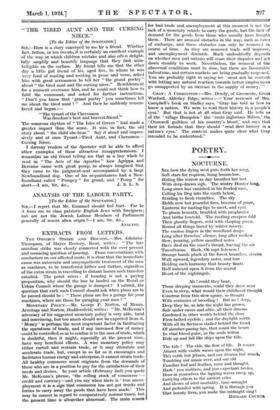" THE. TIRED. AUNT AND THE CURSING NIECE."
[To the Editor of the SPECTATOR.] SIR,—Here is a. story conveyed to me by a friend. Whether fact, fiction, or ben trovato, it is certainly an excellent example of the way in which children mistake and also often delight- fully amplify and beautify language that they find unin- telligible on the surface. My friend tells me that the other day a little girl friend of his, aged five, to whom he was very fond of reading and reciting in prose and verse, asked him with great seriousness to tell her " the grand poetry " about " the tired aunt and the cursing niece." Bewilderment for a moment overcame him, and he could not think how to fulfil the command, and asked for further instructions. " Don't you know that ` grand poetry' you sometimes tell me about the tired aunt ? " And then he suddenly remem- bered and began :— " The tyrant of the Chersonese Was freedom's best and bravest friend."
The sonorous rhythm of " The Isles of Greece " had made a greater impact than the sense. It was, in fact, the old story about " the child she-bear." Say it aloud and impres- sively and at once Tyrant=Tired Aunt, and Chersonese =- Cursing Niece.
I daresay readers of the Spectator will be able to afford other examples of these attractive misapprehensions. I remember an old friend telling me that as a boy when he read in " The Acts of the Apostles " how Agrippa and Berenice came with great pomp, he always imagined that they came to the judgment-seat accompanied by a large Newfoundland dog. One of his acquaintances had a New- foundland. called " Pompey " for grand, and " Pomp " for










































 Previous page
Previous page